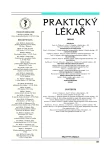How willing are patients to comply with regimen measures?
Ako je to s ochotou pacientov k režimovým opatreniam?
Skúsenosti praktických lekárov s liečbou arteriálnej hypertenzie poukazujú na závažný problém (ne)ochoty pacientov podriadiť sa pokynom lekára. Popritom je zrejmé, že práve compliance je dôležitým predpokladom úspechu poskytovanej zdravotnej starostlivosti (ZS). Ukazuje sa, že nedodržiavanie režimových opatrení býva často neodhaleným dôvodom nezvládnutej liečby ochorenia. Poznanie príčin tohto konania pacientov a ich analýza môÏe napomôcť v skvalitnení ZS, vzostupe spokojnosti pacienta.
Kľúčové slová:
compliance pacienta – arteriálna hypertenzia – režimové opatrenia – organizácia práce lekára.
Authors:
J. Gajdošík; M. Kriška
Authors‘ workplace:
Ústav klinickej farmakológie LF UK, Bratislava, SR
; Ambulancia praktického lekára pre dospelých, Nové Zámky
Published in:
Prakt. Lék. 2005; 85(7): 391-393
Category:
Of different specialties
Overview
Experience of general practitioners with the treatment of arterial hypertension points out a serious problem of the patients’ unwilligness to follow the instructions of their physicians, although it is clear that namely compliance is an important precondition of success in provided medical care. It is very often shown, that the patients’unwilligness to follow the regimen measures seems to be an undetect cause why the treatment is not as succesful as expected, or is totally unsuccessful. To discover the reasons of the patients’ behaviour and their analysis may help us to improve the quality of provided medical care in favour of the patient.
Key words:
patients’compliance – arterial hypertension – regimen measures – physician’s organisation of work.
Labels
General practitioner for children and adolescents General practitioner for adultsArticle was published in
General Practitioner

2005 Issue 7
- Advances in the Treatment of Myasthenia Gravis on the Horizon
- Hope Awakens with Early Diagnosis of Parkinson's Disease Based on Skin Odor
- Memantine in Dementia Therapy – Current Findings and Possible Future Applications
- Memantine Eases Daily Life for Patients and Caregivers
- Possibilities of Using Metamizole in the Treatment of Acute Primary Headaches
-
All articles in this issue
- Q fever – clinical picture
- Q fever: properties of the agent
- Molecular methods in cytogenetic investigations in clinical oncology
- How willing are patients to comply with regimen measures?
- Delirium treated at a gerontopsychiatric ward for acute cases
- Horner’s syndrom: Topical diagnostics of the causative lesion (three case reports)
- Lemierr’s syndrome
- The general practitioner in the eyes of his patient: Interpretation of the results of an empirical survey
- Respecting previously expressed wishes of the patient
- Risks and expectations in health care
- General Practitioner
- Journal archive
- Current issue
- About the journal
Most read in this issue
- Lemierr’s syndrome
- Horner’s syndrom: Topical diagnostics of the causative lesion (three case reports)
- Q fever: properties of the agent
- Q fever – clinical picture
